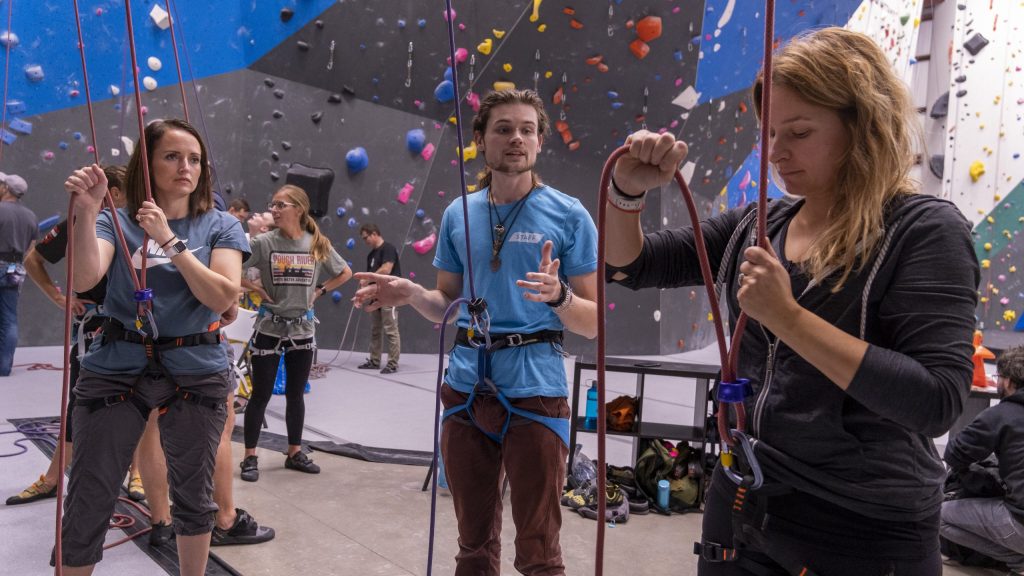Are you a beginner climber seeking to enhance your skills and safety measures? Look no further! In this article, we present the top 5 crucial tips that every beginner climber should know. These tips are designed to boost your confidence and ensure a fun and safe climbing experience.
Top 5 Advices for Novice Climbers

Tip 1: Safety First, Always
Prioritize safety above all else. Learn proper belay techniques and communication with your climbing partner. There is no specific communication that you must use so long as you and your partner communicate effectively.
Double-check knots and harness buckles before every climb. It doesn’t matter if you don’t undo the buckle on your harness when you take it off. You should always check to ensure you and your partner are double-backed before climbing.
Understand and follow gym or crag rules and guidelines. Good gym etiquette is never climbing on a route directly next to somebody, never walking under somebody’s bouldering, and never telling them where to put their hands/feet without asking. If you’re outside, you can find if there are crag rules, like if specific routes are closed due to birds nesting, on Mountain Project, or in a guidebook for the area.
Be aware of your surroundings, including potential hazards like loose rocks, bad bolts, and the weather conditions. Always have a backup plan for emergencies.
Tip 2: Essential Gear and Equipment
This tip is all about investing in your climbing journey. Quality climbing gear, including a well-fitted harness, comfortable climbing shoes, and a helmet, can make all the difference between a pleasant climb and a gear-related distraction.
(Small tip within this tip: Always climb on a dynamic rope. It stretches and absorbs the impact of a fall).
Remember chalk and a chalk bag to dry those sweaty hands!
Tip 3: Technique Matters
Mastering proper technique is fundamental in rock climbing. Focus on efficient movements, weight distribution, and balance.
Practice grabbing various holds in different positions, such as crimps, jugs, slopers, and pinches. You can do this on the ground or while climbing if you know how to grab each hold. Once you do, it will become second nature as you climb more, giving you a sense of accomplishment and progress.
Footwork technique is essential in rock climbing. Inefficient footwork can burn much energy, so precise foot placement is critical. As a beginner, prioritize learning and refining your technique over relying solely on strength.
Tip 4: Building Strength and Endurance
Rock climbing demands both strength and endurance. Climbing 60 feet into the air takes a lot out of you! Indeed, you’d like to climb more than one route every time you get on a rope. Building your strength and endurance through climbing and exercises outside of climbing will allow you to climb more and climb more challenging routes, adding to the thrill and excitement of the sport.
Incorporate climbing-specific exercises into your routine, focusing on core strength, finger strength, and flexibility. Flexibility can be overlooked when climbing because many believe all you need is strength to get to the top of the wall. However, bringing your feet into a position to push yourself higher to reach that next hold is crucial to saving your energy on longer climbs.
Additionally, do some cardiovascular exercises to improve your overall endurance. That can be walking, jumping rope, rowing, or any exercise that gets your lungs pumping. Pulling hard requires a great deal of muscle and lung capacity. The more capacity you allow your muscles to work, the more you can climb.
As you improve, gradually increase the difficulty of your climbs to challenge yourself. You’d be surprised how easy that first route feels after you’ve been climbing for a few months!
Tip 5: Adopting the Right Mindset
Develop a positive and resilient mindset for rock climbing. Only some climbing sessions will be your best, so embrace challenges as opportunities for growth. It’s tough to stay patient during the learning process, but try to focus on celebrating small victories like increased flexibility or technique.
Learn from failures and use them as stepping stones to improvement. After you fall, reflect on why and what you could do differently next time. Sometimes, you didn’t use your feet enough, you’re too tired, or you chose a climb that’s a little out of your pay grade for now. Remember, every fall is a lesson learned, and it’s all part of the journey to becoming a better climber.
Climbing involves overcoming fear and uncertainty, so cultivate a mental toughness when you climb. Climbing can be scary, yes! But if you’re following safe climbing procedures, your confidence in your body will develop, and you’ll be climbing better in no time.

Recent Comments